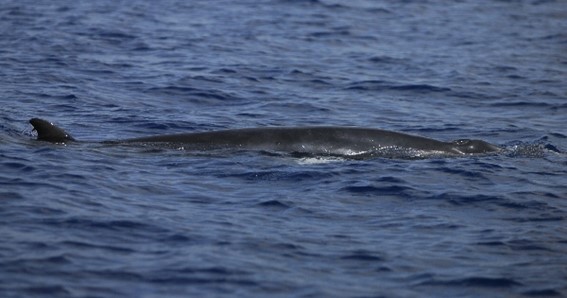A study led by biologist Sílvia Monteiro, from CESAM/DBIO and ECOMARE at the University of Aveiro (UA), identified a temporal shift in the diet of the minke whale in Atlantic waters off the Iberian Peninsula, potentially linked to variations in sardine abundance.
The research analysed the diet of this cetacean species between 2005 and 2024. It found that during the period of sardine scarcity (2005–2015), resulting from prolonged low recruitment associated with fishing above sustainable levels, the diet of the minke whale became more diverse, including species such as horse mackerel, mackerel, and sardine. In the following years, as the sardine stock began to recover (2016–2024), sardine once again became the dominant prey.
The link between the minke whale’s diet and sardine abundance suggests that the fisheries management measures implemented in Portugal had a positive impact on the recovery of this prey species, says Sílvia Monteiro, who co-authored the study alongside researchers Andreia Torres Pereira, Alfredo López, Maria Inês Azevedo, and Catarina Eira. However, the researchers caution that cetaceans with high metabolic demands, like the minke whale, are highly dependent on prey species with high nutritional value. Their physical condition may be compromised when such prey becomes scarce, which could affect the resilience of the population, currently classified as Vulnerable in the Iberian Peninsula.
The study by CESAM/DBIO also highlights a potential overlap between the resources targeted by commercial fisheries and the feeding habits of the minke whale, in terms of species, size, and nutritional quality. Although such overlap does not necessarily indicate direct competition, the researchers warn of the risk of negative impacts when fish stocks decline and face high fishing pressure. In these situations, fishing can pose both direct threats, through bycatch, and indirect threats, through the overexploitation of key prey species essential to the whales’ survival.
Understanding the feeding habits of minke whales is crucial for co-management and conservation efforts, particularly in light of changes in fish stocks. To ensure the sustainability of marine ecosystems and minimise the impacts on this species, the researchers stress the need to strengthen fish stock monitoring and implement measures to reduce cetacean bycatch. They also highlight the importance of international cooperation and strengthening stranding networks to collect more data on the ecology and physical condition of minke whales in this region.
By understanding the ecological role of minke whales, says Sílvia Monteiro, “we can contribute to conservation strategies tailored to multiple species, ensuring coexistence, and improve nature-based solutions aimed at restoring marine ecosystems. Whales play a role in carbon sequestration through the nutrient cycle, which is crucial for marine productivity and, more broadly, for ocean sustainability and climate resilience.”
This study represents the first description of the minke whale’s diet in the southern part of its North Atlantic distribution. It was carried out in collaboration with researchers from the Oceanographic Centre of Vigo (COV, IEO-CSIC), the Institute of Marine Research (IIM-CSIC), and the stranding networks of Portugal (coordinated nationally by the Institute for Nature Conservation and Forests – ICNF) and Galicia (regionally coordinated by the Coordinator for the Study of Marine Mammals – CEMMA). The knowledge gained may contribute to ecosystem-based fisheries management strategies, promoting sustainable coexistence between fishing activities and marine predators.
Originally published in: UA News, March 28, 2025
